On March 24 and 25, 2025, UnitelmaSapienza University and Luiss Guido Carli University hosted the conference within the Project “The Hybridization of the Fight Against Crime in the International Scenario: Comparative Law Findings from the 2022 PRIN Borderline”. This intermediate dissemination initiative of the PRIN research activities consisted of a comparative law review of the topics covered by the project, featuring international scholars involved in PRIN’s comparative research.
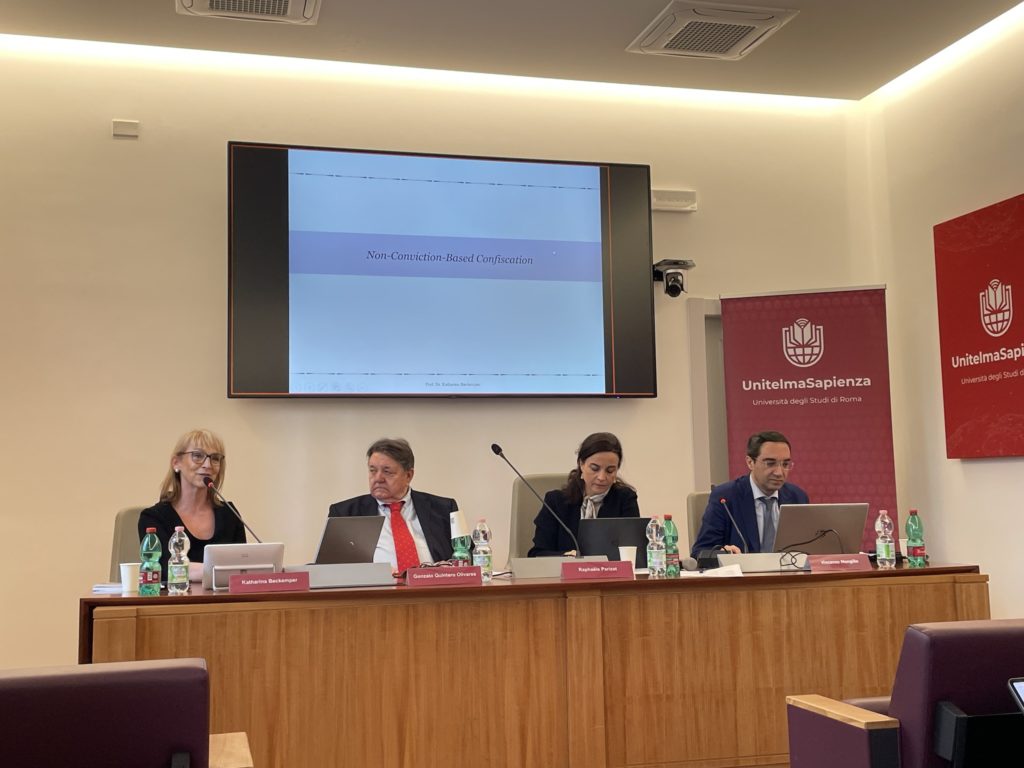
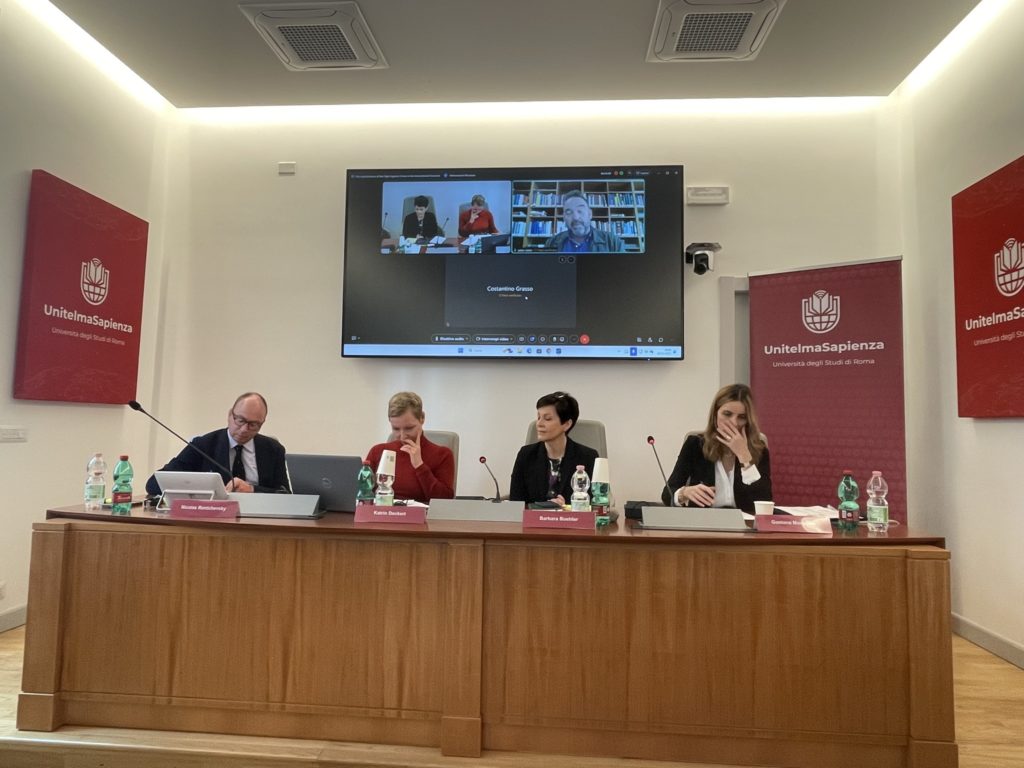
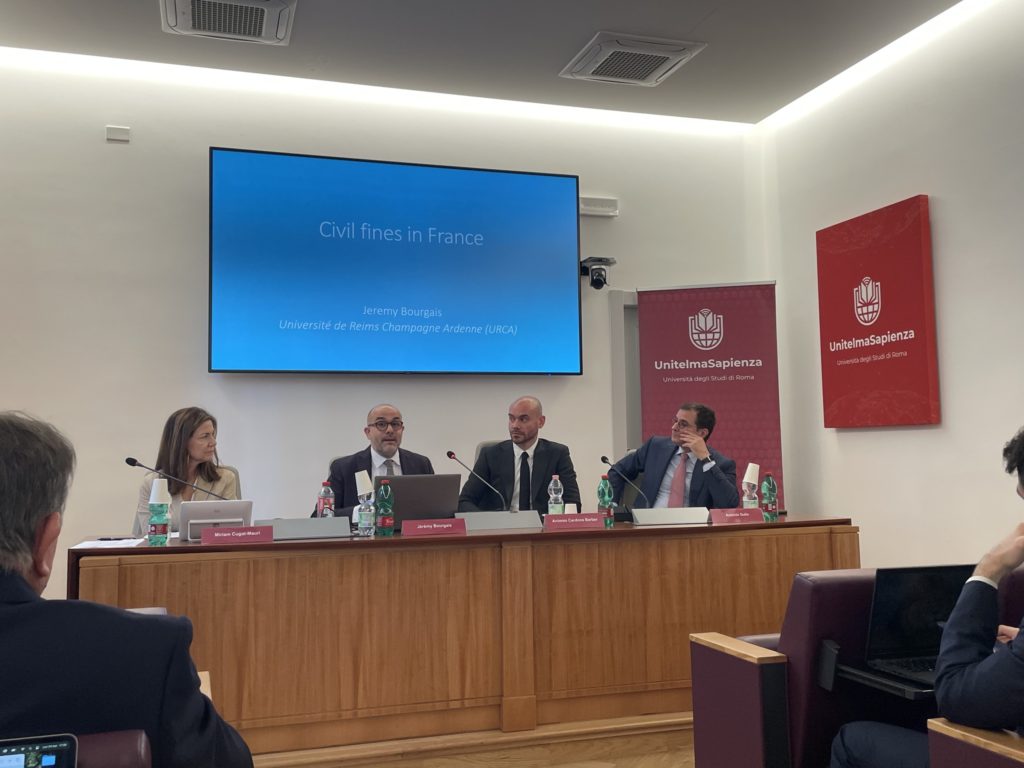
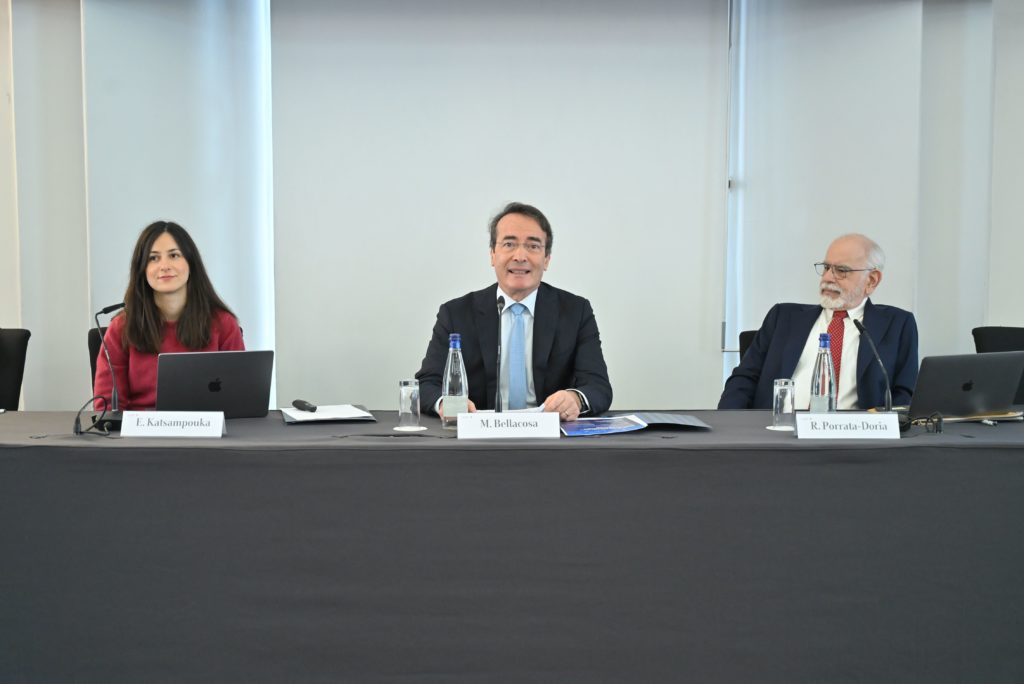
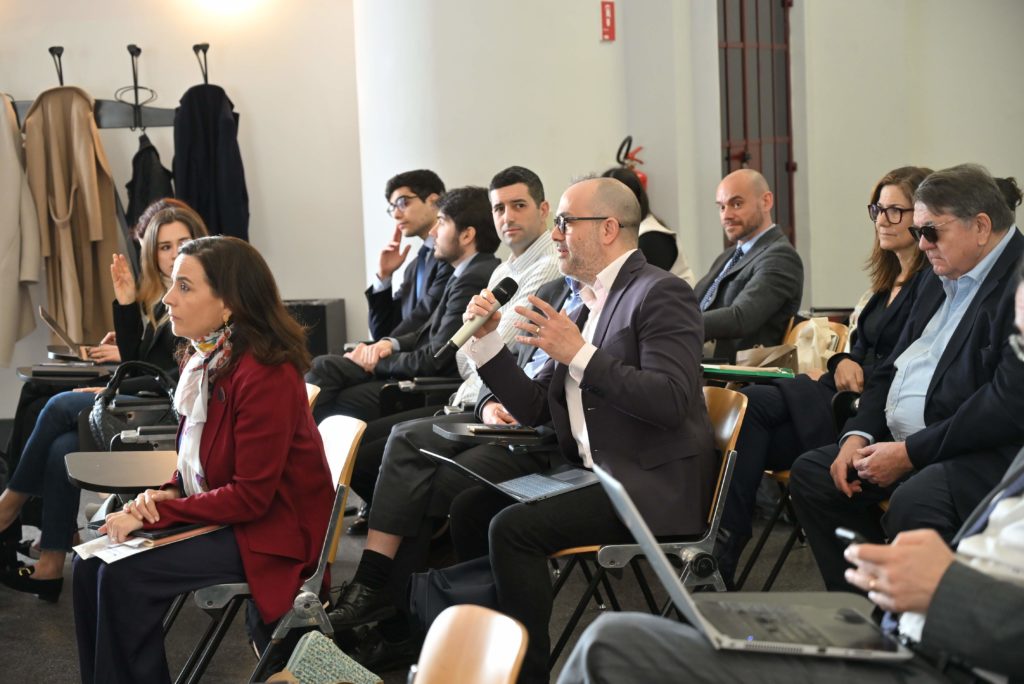
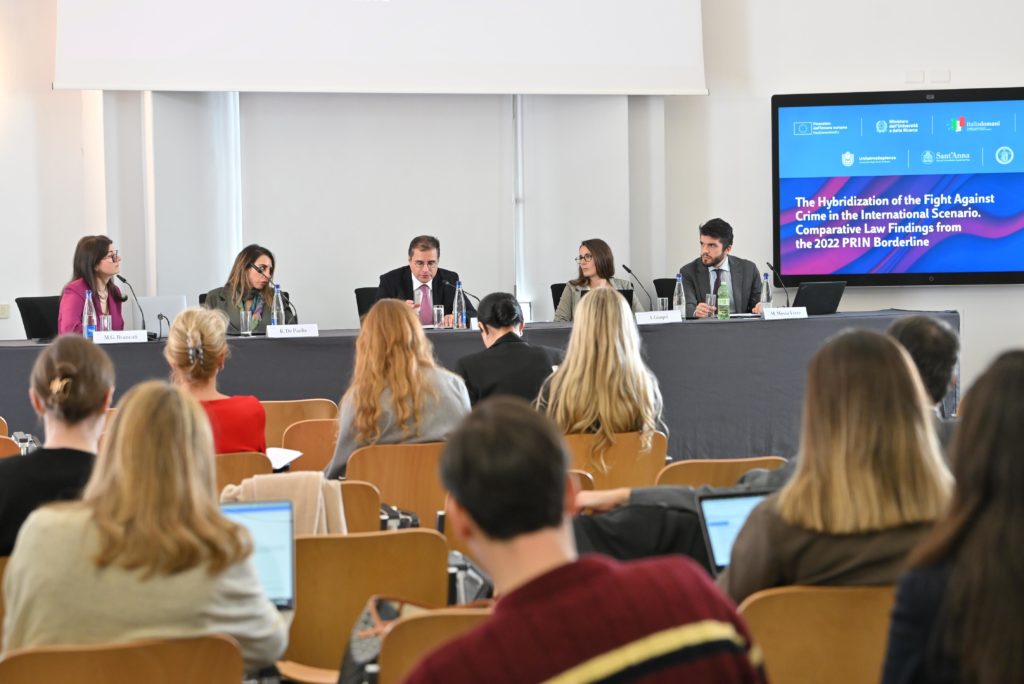
The first day of the event, held in Rome at the UnitelmaSapienza University, began with an opening address by the Rector of UnitelmaSapienza, Prof. Bruno Botta. Professor Botta emphasised the crucial role that the University , plays in promoting the dialogue between scholars from diverse backgrounds, encouraging the creation of an interdisciplinary learning environment. from diverse backgrounds and encouraging interdisciplinary learning. Prof. Nicola Napolitano, Director of the Department of Legal and Economic Sciences at UnitelmaSapienza, then provided a detailed overview of the Borderline project, which explores the evolution of crime-fighting strategies through the adoption of hybrid measures, and thanked the speakers for the high value of their speeches.
The first session of the conference on “Confiscation in the European Legal Landscape“ was moderated by Prof. Vincenzo Mongillo, Professor of Criminal Law at UnitelmaSapienza. Professor Mongillo emphasised the importance of confiscation measures in the fight against crimes and the fact that the legal landscape of penalties and sanctions has evolved significantly over the years, blurring the boundaries between civil and criminal law. The aim of the session, as the professor explained, is to provide a comprehensive overview of the main forms of confiscation in European legal systems and explore their impact on fundamental rights.
One of the speakers was Judge Antonio Balsamo, Deputy General Prosecutor at the Italian Supreme Court, who analysed the different types of confiscation in Italy, focusing on preventive confiscation and its recognition by the European Court of Human Rights in the recent Garofalo v. Italy ruling. He also discussed the role of international cooperation in enforcing preventive measures and, more broadly, in combatting economic crimes.
In the following intervention, Prof. Valsamis Mitsilegas, Professor of European Law at the University of Liverpool, went deeper into the topic of supranational harmonisation, examining the disparities between national confiscation models and analysing the European legal framework, particularly the recent EU Directive 2024/1260. Finally, he expressed some concerns about the applicability of the principle of mutual recognition to non-criminal measures in certain Member States, citing the example of preventive confiscation in Italy.
Prof. Katharina Beckemper, Professor of Criminal law at the University of Leipzig, then took the floor and discussed the concept of confiscation within the German legal system. Professor Beckemper emphasised that the German legal system had adopted the concept of preventive confiscation based on practices in other European countries, including Italy, and focused on the difficulty of proving the illicit origin of assets without a criminal conviction, while also stressing the absence of a reversal of the burden of proof.
Prof. Gonzalo Quintero Olivares, Emeritus Professor of Criminal Law at the Rovira i Virgili University, gave an overview of confiscation in the Spanish legal system. He observed that confiscation initially applied only to drug trafficking and was later extended to other crimes, including those related to criminal and terrorist organisations. He also noted that, although confiscation is not listed as a penalty, some Spanish legal scholars classify it as an accessory measure. Finally, Professor Quintero Olivares pointed out that compatibility issues with the Constitution arise when confiscation is extended to assets not belonging to the defendant, particularly with regard to the presumption of innocence.
The morning session concluded with Prof. Raphaële Parizot, Professor of Private Law and Penal Sciences at the University of Sorbonne in Paris, who analysed the various forms of confiscation under French law and their compatibility with fundamental legal principles, particularly those of proportionality, the presumption of innocence, and equitable access to justice. Professor Parizot emphasised that the presumption of innocence is not compromised by the institution of confiscation, which only comes into play following a final conviction. Even the possibility of ordering, at a pre-trial stage as a precautionary measure, does not imply an exception to the principle.
The afternoon session, titled “Compliance Measures,” was moderated by Prof. Gaetana Morgante, Professor of Criminal Law at the Sant’Anna School of Advanced Studies in Pisa.
The first speaker was Prof. Adán Nieto Martín, Professor of Criminal Law at the University of Castilla-La Mancha and Deputy Director of the Institute of European and International Criminal Law. Prof. Nieto Martín first drew attention to the similarities between compliance measures and sustainability policies within the corporate organization, as both rely on self-regulation by the enterprise. Prof. Nieto Martín proposed several measures to make corporate compliance models more efficient, describing it as “compliance 2.0”. These included increasing stakeholder participation in corporate decision-making, incorporating restorative justice principles into compliance models and enhancing transparency.
Then, Prof. Costantino Grasso, Professor of Criminal Law at the University of Exeter, examined the UK’s regulatory evolution concerning corporate criminal liability, from the OECD Anti-Bribery Convention, signed in December 1997, to the recent Economic Crime and Corporate Transparency Act. Prof. Grasso concluded that the resulting legal framework is a mosaic of various offenses for which corporations are liable if they fail to prevent them.
Prof. Barbara Boehler, Senior Director of the Corporate Compliance and Ethics Program at Fordham University School of Law, then took the floor explaining the role of compliance officers in the United States. Professor Boehler highlighted how the most relevant regulations are not found in legislative texts but in best practices developed by the US Department of Justice (DOJ). These best practices require compliance officers to share responsibility and give them the authority to hire, reward or punish employees based on their conduct.
The final presentation of the roundtable was given by Prof. Katrin Deckert, member of the National Association of French Public Limited Companies (ANSA) and Professor of Private Law at the University of Paris Nanterre, and Prof. Nicolas Rontchevsky, Professor of Private Law and Penal Sciences at the University of Strasbourg. After discussing the Airbus case (2020), the speakers explained how corporate criminal liability was introduced in France in 1994, when it became mandatory for companies to adopt corporate compliance models. Prof. Deckert also pointed out that corporate compliance had recently been reformed by the Sapin 2 Law of 2016, which was aimed at preventing French companies from being sanctioned by the United States.
The second roundtable of the afternoon, titled “Punitive Civil Liability in European Civil Law Systems,” was introduced and moderated by Prof. Antonio Gullo, Professor of Criminal Law at Luiss Guido Carli University and Principal Investigator of PRIN 2022 “Borderline.”
The discussion began with Prof. Jeremy Bourgais, Professor of Private Law and Penal Sciences at the University of Reims Champagne-Ardenne, who focused on civil sanctions within the French legal system. Professor Bourgais explained how amendes civiles were introduced in the 20th century to serve as a deterrent against certain civil wrongs. He then addressed concerns regarding compliance with constitutional safeguards and the European Convention on Human Rights (ECHR) and emphasized that civil sanctions can be applied not only as alternatives to criminal penalties but also in addition to them.
The second intervention was made jointly by Prof. Miriam Cugat-Mauri and Prof. Antonio Cardona Barber, Professors of Criminal Law at the Autonomous University of Barcelona. Professor Cugat-Mauri, first, pointed out that a process of decriminalization has also taken place in Spain, which has occurred in two phases. The first occurred in the 20th century with the adoption of the Constitution and the new Spanish Penal Code, which was ideologically aligned with emerging democratic and socio-economic values. The second phase took place in the 21st century with the repeal of Book III of the Penal Code, which had been devoted to minor offences (faltas). Professor Cardona Barber pointed out that the Spanish legal system generally does not provide for punitive civil sanctions, as they are considered incompatible with the constitutional framework. However, he noted that certain measures may produce effects similar to those of civil sanctions. In recent judicial decisions, Spanish courts have begun to recognize forms of compensation for moral damages that, in terms of their financial magnitude, resemble punitive damages.
Prof. Martin Wassmer, Professor of Criminal Law and Criminal Procedural Law at the University of Cologne, and Dr. Damien Nippen, Professor of Criminal Law at the University of Cologne, concluded the day. First, it was pointed out that, in the German legal system, there is a constitutional limit to the introduction of punitive damages, according to which the compensatory function cannot be realized beyond the amount of the compensable damage. Therefore, there is a clear separation between criminal punishment and civil compensation. Professor Wassmer, however, mentioned how, in opposition to this general principle, there are some civil actions that have a punitive function. The discussion was continued by Professor Nippen, who examined the concerns regarding the protection of legal guarantees in relation to compensatory remedies that also serve punitive purposes. He also explored the potential implications that the introduction of punitive damages might have within the German legal system.
The second day of the conference took place on 25 March 25, 2025, at Luiss University in Rome.
The morning session, entitled “Punitive Civil Liability in Common Law Systems,” was opened by welcoming remarks and an introduction by Prof. Maurizio Bellacosa, Professor of Criminal Law at Luiss Guido Carli University. In presenting the topics to be addressed by the international speakers, Professor Bellacosa pointed out that while common law countries have a longstanding tradition of recognising punitive damages, in the Italian legal system “illeciti civili punitivi” have only recently emerged.
The first presentation was delivered by Dr. Eleni Katsampouka, Lecturer in Law at King’s College London, who emphasised that the main objective of punitive damages is to shift the burden of the wrongful conduct to the injured party to the injurer, thereby achieving a deterrent effect. Dr. Katsampouka explained that in the United Kingdom, punitive damages are regarded as a measure of extrema ratio and are not applicable in collective proceedings. In practice, they are primarily awarded in cases involving insurance fraud and police misconduct. She further noted that the awarding of punitive damages and the determination of their amount take into account several principles, including moderation and proportionality relative to the defendant’s income, but are not subject to the procedural safeguards of criminal law.
Following this, Prof. Rafael Porrata-Doria, Professor at Temple University, Beasley School of Law, took the floor. He provided a brief overview of the historical evolution of punitive damages, beginning with the importation of the concept from UK law. Professor Porrata-Doria explained that, starting in the 1980s, individual U.S. states began to legislate on the matter. Currently, in almost all federal states, the jury’s decision to award punitive damages is discretionary, and the determination of their monetary amount is also to be considered discretionary. Nevertheless, punitive damages are not considered to violate the Fourth Amendment per se, unless deemed excessive. To identify when an award is excessive, the courts have developed a set of guidelines that take into account, among other factors, the reprehensibility of the conduct and the disparity between the parties. Finally, Professor Porrata-Doria analyzed two institutions that reflect the hybridization of civil and criminal law: the qui tam action and the mechanism of civil forfeiture.
The morning session concluded with a panel entitled “Italian hybrid measures in context. State of the Art, Comparative Insights and Future Perspectives“ introduced and moderated by Prof. Antonio Gullo, Professor of Criminal Law at Luiss Guido Carli University. As Principal Investigator of the PRIN Project, Professor Gullo outlined the key milestones of the research.
The floor was then given to Dr. Maria Giovanna Brancati, a research fellow in Criminal Law at UnitelmaSapienza, took the floor and conducted a comparative survey on three main types of confiscation — extended confiscation, value-based confiscation, and “non-conviction-based” confiscation — across the legal systems of France, Spain, Germany, the United Kingdom, and Italy. Her comparative analysis highlighted several recurring thematic issues, including the balance between mandatory and discretionary application of these measures; the multifaceted nature of confiscation, which oscillates between punitive, preventive, and restorative functions; the broadening of the concept of “confiscable asset”, which in some jurisdictions encompasses items not strictly considered the “product” or “proceeds” of a crime; and, more broadly, the pressing need for harmonization of these regimes at the European level.
Secondly, Dr. Roberta De Paolis, research fellow at the Scuola Superiore Sant’Anna, offered reflection on compliance, underscoring its crucial function in the context of hybridization between criminal law and corporate liability. Dr. De Paolis emphasised the hybrid nature of corporate criminal law, which no longer solely focuses on prohibiting unlawful conduct but increasingly serves as a framework for imposing positive organizational and cooperative obligations. Within this perspective, she highlighted the importance attributed to post-offense cooperation and the emergence of reward mechanisms for companies that adopt effective compliance models.
Dr. Ilaria Giugni, a research fellow at the Federico II University of Naples, then addressed the topic of anti-mafia disqualification measures, a distinctive feature within the legal landscape of the European Union. After outlining their purpose — to certify that a business seeking to engage in economic relations with public administration has no ties to criminal organizations, thereby preventing mafia infiltration into the economy — she focused on the application procedure and the stigmatizing effects these measures may entail. Dr. Giugni pointed out a paradox: although these are administrative measures imposed by an administrative authority (the prefect), they often have highly punitive and severe consequences, including the forced closure of the affected business. There are other problematic aspects of the relevant legislation, particularly the vagueness of its prerequisites, the lack of procedural safeguards for targeted entrepreneurs, and the low evidentiary threshold required for their issuance. The last report of the roundtable was given by Dr. Marco Mossa Verre, a research fellow in Criminal Law at Luiss Guido Carli University, who examined the decriminalization process in Italy and the introduction of “illeciti civili punitivi” with the D.lgs. 7/2016. Dr. Mossa Verre highlighted that “illeciti civili punitivi” have a hybrid nature, between civil law, administrative and criminal law. In addition, Dr. Mossa Verre highlighted the key elements of the legislation and the political-criminal rationale behind the decriminalization through civil sanctions. From a de iure condendo perspective, the speaker presented several reform proposals discussed within the Project, aimed both at strengthening the current framework governing “civil punitive sanctions” and at providing complementary measures to the existing criminal law framework.
.